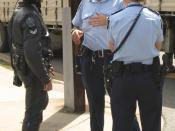Argument Talk All human beings communicate in various ways, especially when arguing. Some people may seem very intelligent, smart, kind, and lovely on a regular basis. However, in distinct situations, when one becomes upset, angry, or discouraged, this lovely person may become like a monster enraged or just unattractively crazy. There are different characteristics in different people that are usually are displayed when something bad happens to them. "Of all the ways people might conduct themselves in angry or stressful confrontations, three types of responses are most common: they may "buckle" under the pressure by crying and basically "surrendering" to the stress; they may give full rein to the anger they are feeling through loud, rash, and physical fighting; or they may calmly and respectfully rationalize the situation, attempting to find a peaceable settlement of the misunderstanding." In a verbal argument, the people who usually start crying right away are often stereotyped as crybabies.
These very emotional people who basically cannot stand when somebody raises their voice at them or says something injuring to them. It seems that these type of people cannot stand up for themselves because their nervous system is not strong enough to handle severe situations. A good example is little children: when mommy or daddy make parental remarks in high tones, they burst into tears. The reader might disagree with the writer's example just because children are sometimes on a lower level of understanding family circumstances. However, some adults grow up with nervous system problems and act just like children in upsetting situations because they are not equipped for emotional stress. As a result, it is very easy for some grown ups to burst into tears in certain situations. According to the explanation above, the reason people get so emotional and start crying easily, in a verbal argument, is because it is "not their fault"ÃÂ that it happens to them. Some people are probably naturally high-strung & emotional; others perhaps never learned how to maturely deal with their emotions.
The second example is about aggressive people. Imagine this: five o'clock on a Friday evening, the Turnpike is packed with drivers that want to get home as soon as possible to start their weekend. The weather is just unbelievably beautiful for a cold March madness month. Most of the driver's are driving a little faster than the speed limit allows, and all of the sudden the traffic starts slowing down little by little to a complete stop or perhaps five to ten miles an hour for the drivers in the lucky lanes. This kind of situation happens frequently because of car accidents or construction on the road. Most of the drivers show common courtesy for the other drivers on the road. However, there are drivers that think they can avoid waiting in traffic so they start cutting in front of other drivers to get into the lane that seems to be moving. Not only do these drivers put themselves and other drivers in danger, they also instigate and annoy the drivers that are patiently waiting to get home or to where ever they are going. As a result, the patient drivers start beeping their horns and become inpatient. As a response, the drivers with no common courtesy yell something insulting out or show a middle finger to present that he or she does not care. These two drivers start yelling things back and forth through open windows. Eventually one of them steps out of the car because he or she wants to verbally insult the "guilty party"ÃÂ directly to their face. In other words, they want a physical fight. This shows that the people who become immediately hot and take action in arguments usually lack normal communication skills.
Finally, the people who talk things out and act calmly in verbal arguments control their anger and avoid unpleasant situations with whomever they encounter. A good example is police officers, military and army officers. Police officers go through a lot of daily stress, they learn how to deal with people that cause them problems. They just write out tickets to punish the people who cause trouble, instead of screaming and throwing their arms around. Of course, everyone knows that police officers are trained to perform physical combat if necessary. However, their jobs require them to talk things out and deal with all manners of emotionally volatile human situations. What would happen to the world if a police officer just could not handle him or her self in a situation and opened fire because they have legal access to a gun? Police officers are suppose to serve and protect not attack people. Therefore, police officers have to know how to control themselves, especially in America where anyone has a right to sue, even if the person is dead wrong. The same situation applies to with military and army officers. If they got upset and cursed everyone out in volatile situations, they would be left without a job. The army has to teach people to serve the country, not go ballistic in case of an emergency.
In conclusion, the writer wants to say that for some people it is harder to control his or her emotions and/or temper than for others. Nobody is born perfect with calm temperaments or controlled emotions. World peace has to be achieved one person at a time. Especially, since the violence among young people is likely a direct result of seeing so many adult role models acting so immaturely and selfishly. We, the community of the world, are all examples to young people around us and are obliged to act responsibly in order to make the world a better place.





